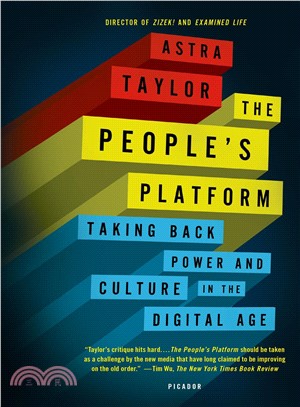目前查詢
歷史查詢

The people's platform :taking back power and culture in the digital age /
- 館藏(1)
- 書目資訊
- 心得(0)
- 機讀格式
- 標籤
書名 : The people's platform :taking back power and culture in the digital age /
紀錄類型 : 書目-語言資料,印刷品: 單行本
正題名[資料類型標示]/作者 : The people's platform :Astra Taylor.
其他題名 : taking back power and culture in the digital age /
作者 : Taylor, Astra.
版本項 : First Picador edition.
出版者 : New York :Picador, Henry Holt and Company,2015.
面頁冊數 : 276 p. ;21 cm.
附註 : A Metropolitan Book.
內容註 : A peasant's kingdom -- For love or money -- What we want - - Unequal uptake -- The double anchor -- Drawing a line.
標題 : Internet
ISBN : 9781250062598 (pbk.) :
發表心得
LEADER 02623cam a2200277 a 4500
001 81052
003 TNML
005 20151028183213.0
008 180319s2015 nyu e 000 0 eng d
010 $a2012042645
020 $a9781250062598 (pbk.) :$cNT533$
035 $aNO000069518
035 $a854503
037 $a公共圖書館臺南分區資源中心
040 $aYDXCP$beng$erda$cYDXCP$dBTCTA$dBDX$dOCLCQ$dTAMCT$dOCLCO$dTWTNM
050 04$aHM851$b.T39 2015
082 0 $a302.231$222
090 $a臺南市立圖書館
100 1 $aTaylor, Astra.
245 14$aThe people's platform :$btaking back power and culture in the digital age /$cAstra Taylor.
250 $aFirst Picador edition.
260 $aNew York :$bPicador, Henry Holt and Company,$c2015.
300 $a276 p. ;$c21 cm.
500 $aA Metropolitan Book.
504 $aIncludes bibliographical references (p. [233]-263) and index.
505 0 $aA peasant's kingdom -- For love or money -- What we want - - Unequal uptake -- The double anchor -- Drawing a line.
520 $aFrom a cutting-edge cultural commentator and documentary filmmaker, this work is a bold and brilliant challenge to cherished notions of the Internet as the great democratizing force of our age. The Internet has been hailed as a place where all can be heard and everyone can participate equally. But how true is this claim? In this seminal dismantling of techno-utopian visions, the author argues that for all that we tweet and like and share, the Internet in fact reflects and amplifies real-world inequities at least as much as it ameliorates them. Online, just as off-line, attention and influence largely accrue to those who already have plenty of both. What we have seen so far, she says, has been not a revolution but a rearrangement. Silicon Valley tycoons now coexist with Hollywood moguls ; a handful of giants like Amazon, Apple, Google, and Facebook remain the gatekeepers. And the worst habits of the old media model, the pressure to seek easy celebrity, to be quick and sensational above all, have proliferated online, where aggregating the work of others is the surest way to attract eyeballs and ad revenue. When culture is free, creative work has diminishing value and advertising fuels the system. The new order looks suspiciously like the old one. We can do better, the author insists. The online world does offer an unprecedented opportunity, but a democratic culture that supports diverse voices, work of lasting value, and equitable business practices will not appear as a consequence of technology alone. If we want the Internet to truly be a people's platform, we will have to make it so.-- Publisher information.
650 0$aInternet$xSocial aspects.
650 0$aVirtual reality.
650 0$aEquality.
653 $a知識性
